Phase II of IMO’s Maritime Technology Cooperation Centre Project Announced
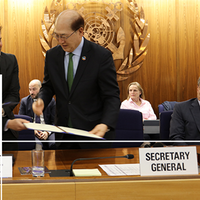
The IMO and the European Commission (EC) have announced a second phase of the Global Maritime Technology Cooperation Centres Network (GMN) project, with funding from the EU.The aim of the second phase is to upscale the work of the five regional centres, with a particular emphasis on pilot demonstrations aimed at achieving quantifiable reductions in GHG emissions.The GMN Phase II project follows the successful Phase I which established the five Maritime Technology Cooperation Centres (MTCCs), in Africa, Asia, the Caribbean, Latin America and the Pacific.
Shipping Will Need a Third of World’s Carbon Neutral Fuel by 2030
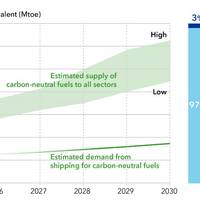
According to the latest edition of DNV’s Maritime Forecast to 2050, the shipping industry will find it challenging to secure enough supply of carbon-neutral fuels.To meet the anticipated demand of 17 million tonnes of oil equivalent (Mtoe) annually by 2030, the maritime sector would need to access 30-40% of the projected worldwide carbon-neutral fuel supply.As the shipping industry will compete for these fuels with aviation and road transportation, as well as other industries, their production needs to significantly accelerate if the industry’s emission-reduction goals are to be met.
Shipping's Uptake of Biofuels Likely to be Challenged by Scarcity of Supply
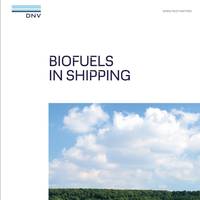
DNV's latest white paper “Biofuels in shipping” finds that the flexibility of biofuels can enable the shipping industry to accelerate its journey towards decarbonization, but current limitations in production capacity may impact short-term supply and create stiff competition with other sectors.The current global production capacity of sustainable biofuels is around 11 million tonnes of oil equivalent (Mtoe) per year. DNV estimates that the limit for the global sustainable and economical biofuel potential lies between 400 – 600 Mtoe per year in 2030…
IMO Sec-Gen Marks Entry Into Force of Carbon Intensity Rules
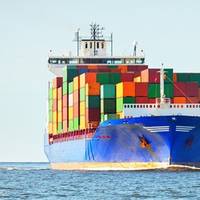
Amendments to the International Convention for the Prevention of Pollution from Ships (MARPOL) Annex VI entered into force on Tuesday, November 1, 2022. Developed under the framework of the Initial IMO Strategy on Reduction of GHG Emissions from Ships agreed in 2018, these technical and operational amendments require ships to improve their energy efficiency in the short term and thereby reduce their greenhouse gas emissions. From January 1, 2023, it will be mandatory for all ships…
DNV's Maritime Forecast to 2050: No Industry Can Decarbonize in Isolation
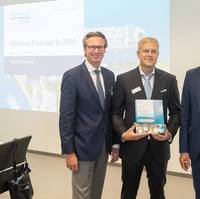
Maritime classification society DNV on Tuesday unveiled its latest Maritime Forecast to 2050 report with a new focus on how to overcome the “ultimate hurdle” of fuel availability.The 84-page forecast is the sixth edition of its kind, and this year it considers the comprehensive production, distribution and bunkering infrastructures required to enable the maritime industry’s shift to carbon-neutral fuels.The report also presents an updated outlook on regulations, drivers, future technologies, and costs for decarbonizing shipping.
COP 25: The Affordable Energy Transition
By Sverre Alvik, Energy transition program director, DNV GLIt is not too good to be true, it is the economic reality that lies ahead of us. The energy transition facing us in the coming decades is an affordable one. In fact, the future energy system is not only affordable, it is cheaper than the energy system we have today. And this creates an opportunity to invest more to achieve the future we want.Let me be more precise: in just one generation, humanity will be spending a much lower share of its GDP on energy than it does today. The main reason is not energy prices, but energy efficiency. Whether you believe in the phenomenon of peak energy…
EU/IMO Project Drives Energy Efficiency
A global network of maritime technology cooperation centers has completed an impressive array of pilot projects over the past three years, helping to drive forward the changes which are required to reduce GHG emissions from shipping.Five regional Maritime Technology Cooperation Centres (MTCCs) have been established under the Global Maritime Technology Cooperation Centers (GMN) Project, which is funded by the European Union and implemented by the International Maritime Organization (IMO), the United Nations specialized agency with a remit to develop and adopt standards for safer, greener and more sustainable shipping.Between them, the MTCCs count 97 participating countries and have been working with 1…
EU/IMO Global Project Drives Energy Efficiency
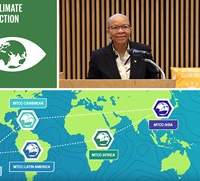
The GMN global network of maritime technology cooperation centers has completed numerous pilot projects over the past three years, helping to drive forward the changes which are required to reduce GHG emissions from shipping. A global network of maritime technology cooperation centers has completed an impressive array of pilot projects over the past three years, helping to drive forward the changes which are required to reduce GHG emissions from shipping.Five regional Maritime…
Workshop on Clean Shipping in Red Sea
Measures for preventing air pollution from ships as well as energy efficiency requirements for ships are in the spotlight at a training event for eight countries in the Red Sea, Gulf of Aden and the Gulf.The participating countries are Bahrain, Djibouti, Egypt, Jordan, Saudi Arabia, Somalia, Sudan and United Arb Emirates.The regional workshop in Jeddah, Saudi Arabia (17-19 September) has covered International Maritime Organization (IMO) 's MARPOL Annex VI treaty, which limits the main air pollutants contained in ships exhaust gas, including sulphur oxides and nitrous oxides, and includes energy-efficiency measures aimed at reducing greenhouse…
UAE Signs IMO Treaty
The United Arab Emirates (UAE) has become the latest State to accede to the International Maritime Organization (IMO)instrument providing rules for the prevention of air pollution from ships and energy efficiency requirements.This brings the total number of ratifications of MARPOL Annex VI to 93, representing 96.6% of world merchant shipping tonnage, said the UN body in a release.MARPOL Annex VI limits the main air pollutants contained in ships exhaust gas, including sulphur oxides and nitrous oxides, and prohibits deliberate emissions of ozone depleting substances. It also includes energy-efficiency measures aimed at reducing greenhouse gas emissions from ships.Ms.
IMO Highlights Greenhouse Gas Strategy
International Maritime Organization (IMO) is at the UN climate change conference (COP 24) in Poland, highlighting key elements of the Initial IMO Strategy on reduction of GHG emissions from ships.A press release from the UN-body said that the strategy sets out a vision to reduce the total annual Greenhouse Gas (GHG) emissions by at least 50% by 2050 compared to 2008, while, at the same time, pursuing efforts towards phasing them out entirely. This sets a pathway of CO2 emissions reduction consistent with the Paris Agreement temperature goals.IMO reported to the Subsidiary Body for Scientific and Technical Advice (SBSTA 49) on the Organization’s actions and commitment to reduce emissions from international shipping…
Training on Ship Fuel Data Collection in China
The International Maritime Organization (IMO)-led GloMEEP project has delivered a training course in China last week to help maritime administrations and classification societies play their part in an ambitious scheme to collect fuel consumption data from ships.The data collected will provide vital information to support IMO’s global efforts to reduce greenhouse gas emissions from international shipping. From 1 January 2019 ships of 5,000 gross tonnage and above will have to collect consumption data for each type of fuel oil they use. These ships account for approximately 85% of CO2 emissions from international shipping.The data collected will be kept in a database hosted by IMO and will provide a firm basis on which future decisions on additional energy-efficiency measures…
GMN Promotes Technologies to Cut Shipping Emissions
Practical efforts to implement ship energy-efficiency measures and promote technology transfer are an integral part of International Maritime Organization (IMO)'s initial strategy to reduce greenhouse gas emissions from ships.A press release from the UN-body said that this is embodied in the global network for energy-efficient shipping under the Global MTCC Network (GMN) project, funded by the European Union and run by IMO.Representatives from the five Maritime Technology Cooperation Centres (MTCCs) in the GMN network recently met for their second annual meeting (22-26 October) in London, United Kingdom, on the sidelines of IMO’s Marine Environment Protection Committee (MEPC 73) meeting.Technical training for MTCC staff on energy efficiency in ship design and operations…
Decarbonization: 34 Maritime CEOs Call for Action
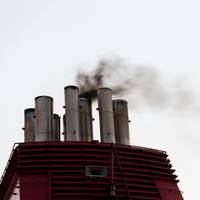
A who’s who list of maritime industry executives have signed on to voice their support for a zero-carbon future in shipping.The not-for-profit foundation the Global Maritime Forum brought together a group of 34 CEOs and industry leaders from across the global maritime sector to sign a call for action and lead the industry in a transition toward decarbonization.To achieve this, these leaders believe the maritime industry needs to accelerate both technological and business model innovation…
DNV GL: Classification More Relevant than Ever
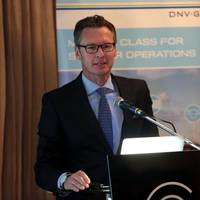
In an increasingly complex, fast changing, and challenging market, the role of the classification society is more relevant than ever, said Knut Ørbeck-Nilssen, CEO of DNV GL – Maritime, at a press conference ahead of Posidonia trade fair in Athens. Class enables innovation in shipbuilding, guides owners and operators through a demanding regulatory landscape, and helps the industry tackle cyber-crime, he underlined.Leading off the press conference, DNV GL Group President & CEO Remi Eriksen explained that two megatrends are impacting the maritime industry: decarbonization and digitalization.
IMO Conducts Port Emissions Training
For ports to cut emissions to ensure cleaner air and contribute to the battle against climate change, they first need to quantify emissions and then identify measures to reduce port-related emissions in a cost-effective way. The on-going strategic partnership between the International Maritime Organization (IMO) -run GloMEEP project on energy-efficiency and the International Association of Ports and Harbors (IAPH) is helping selected countries to develop port emission inventories and subsequently draw up a port emission reduction strategy. To-date, four countries have benefited from a new IMO training package, the latest being the Philippines – with a workshop in Manila (15-17 May).
Monaco Accedes IMO Emissions Treaty
Monaco has acceded to the International Maritime Organization (IMO) treaty covering emissions from ship exhausts and energy efficiency (MARPOL Annex VI). The instrument limits the main air pollutants contained in ships exhaust gas, including sulphur oxides and nitrous oxides, and prohibits deliberate emissions of ozone depleting substances. It also includes energy-efficiency measures aimed at reducing greenhouse gas emissions from ships. Mrs. Isabelle Rosabrunetto, Permanent Representative of Monaco to IMO, met IMO Secretary-General Kitack Lim at IMO Headquarters, London, to deposit the instrument of accession (14 May). Although air pollution from ships does not have the direct cause and effect associated with…
IMO Trains Iranian Officials
Iranian officials responsible for implementing IMO standards on air pollution and greenhouse gas emissions from shipping are undergoing IMO training at a national workshop in Tehran, Islamic Republic of Iran (18 April). Around 30 participants from the country’s Ports and Maritime Organization (PMO), Department of Environment and numerous ports are taking part. They are being trained on the IMO treaty restricting air pollution from ships as well as ship energy-efficiency measures – MARPOL Annex VI. This includes measures addressing sulphur oxide (SOx) and nitrogen oxide (NOx), which have been successful in lowering the amount of those pollutants being emitted from ships. The event was hosted by the PMO and run by IMO’s Astrid Dispert and a consultant.
Reducing Emissions in Ports
How can ports cut emissions to ensure cleaner air and contribute to the battle against climate change? First, ports need to quantify emissions in ports, then they need to identify measures to cost-effectively reduce port-related emissions. A strategic partnership between the International Maritime Organization (IMO)-executed GloMEEP energy efficiency project and the International Association of Ports and Harbors (IAPH) is helping selected countries to develop port emission inventories and subsequently draw up a port emission reduction strategy. A new three-day workshop package on the “Prevention and control of shipping and port air emissions” is being developed as part of the GloMEEP-IAPH strategic partnership.
IMO/MARPOL Amendments Enter Into Force
Requirements for ships to collect data on their fuel oil consumption entered into force on 1 March. Other important amendments to the International Convention for the Prevention of Pollution from Ships (MARPOL) have also entered into force, covering the classification of garbage, including the addition of a new category of “e-waste”, and amendments to the International Oil Pollution Prevention Certificate. The ship fuel oil consumption data reporting requirements are the latest mandatory requirements aimed at enhancing the energy efficiency of international shipping. The data collection will begin on 1 January 2019 with data reported at the end of each calendar year to the International Maritime Organization (IMO)…
Private Sector Partners in Pursuit of Low Carbon Shipping
The ground-breaking Global Industry Alliance (GIA) – a partnership of key maritime stakeholders pursuing low carbon shipping – has met at International Maritime Organization (IMO) Headquarters, London (7 December). The GIA is made up of leading shipowners and operators, classification societies, engine and technology builders and suppliers, big data providers, port and oil companies – tasked with identifying and developing innovative ways to encourage use of energy-efficiency technologies and operations. The GIA Task Force meeting, the second one in the series, saw 20 industry representatives from across the Alliance’s 16 member companies discuss how to make further progress on on-going GIA funded activities and to agree new priority areas to pursue under the partnership.
Iceland Accedes to Air Pollution Treaty
The International Maritime Organization (IMO) treaty covering the prevention of air pollution from ships has been ratified by Iceland, bringing the total number of contracting States to 89, and representing more than 96% of world merchant shipping tonnage. The MARPOL Annex VI treaty limits the main air pollutants contained in ships exhaust gas, including sulphur oxides and nitrous oxides, and prohibits deliberate emissions of ozone depleting substances. It also includes energy-efficiency measures aimed at reducing greenhouse gas emissions from ships. Stefán Haukur Jóhannesson, Ambassador of Iceland to the United Kingdom, met IMO Secretary-General Kitack Lim at IMO Headquarters, London (22 November) to deposit the instruments of accession.
Collaboration for Future Ready Shipping
"No stakeholder, alone, can deal with the complexities the planet faces in addressing the challenge of climate change", said International Maritime Organization (IMO)'s Director of the Marine Environment Division, Stefan Micallef. He was opening the joint Singapore-IMO International Conference on Maritime Technology Transfer and Capacity-Building also known as Future-Ready Shipping Conference 2017, held in Singapore (25-26 September). The Conference looked at future collaborations that can drive discussions towards identifying opportunities that can have an impact on the shipping industry as it moves towards decarbonization. The event also included sessions covering the latest trends in maritime and port energy efficient technologies…







